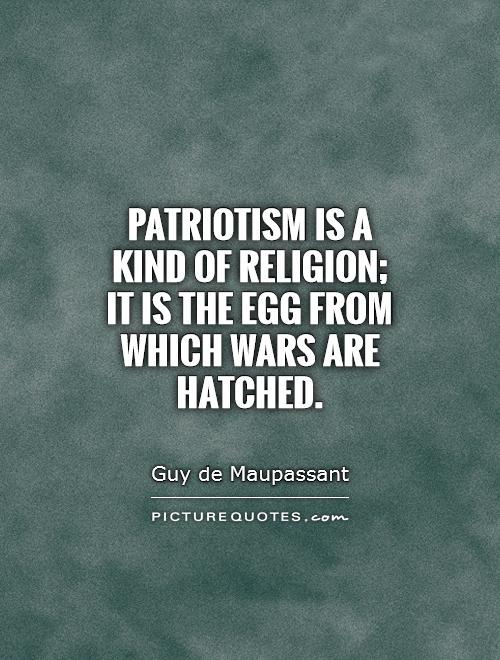Patriotism is a kind of religion; it is the egg from which wars are hatched

Patriotism is a kind of religion; it is the egg from which wars are hatched
Guy de Maupassant, a renowned French writer known for his realistic and often cynical portrayals of human nature, once famously said, “Patriotism is a kind of religion; it is the egg from which wars are hatched.” This statement encapsulates the complex and often dangerous relationship between patriotism, nationalism, and conflict.Patriotism, defined as love and devotion to one's country, can indeed be likened to a religion in many ways. Like religion, patriotism often involves a deep emotional attachment to a set of beliefs and values that are passed down through generations. It can inspire a sense of unity and community among individuals who share a common national identity. However, just as religious fervor can lead to intolerance and conflict, so too can excessive patriotism breed division and aggression.
One of the most troubling aspects of patriotism is its potential to fuel nationalism, an extreme form of loyalty to one's nation that often involves a sense of superiority over other countries. Nationalism can lead to a dangerous us-versus-them mentality, where those who do not share the same national identity are viewed as enemies or threats. This mindset can easily escalate into conflict and war, as history has shown time and time again.
Maupassant's assertion that patriotism is the egg from which wars are hatched is a stark reminder of the destructive power of nationalistic fervor. Throughout history, wars have been fought in the name of patriotism, with leaders and governments using appeals to national pride and loyalty to justify acts of aggression and violence. The belief that one's country is superior to others can create a dangerous sense of entitlement and righteousness that can lead to devastating consequences.












 Friendship Quotes
Friendship Quotes Love Quotes
Love Quotes Life Quotes
Life Quotes Funny Quotes
Funny Quotes Motivational Quotes
Motivational Quotes Inspirational Quotes
Inspirational Quotes